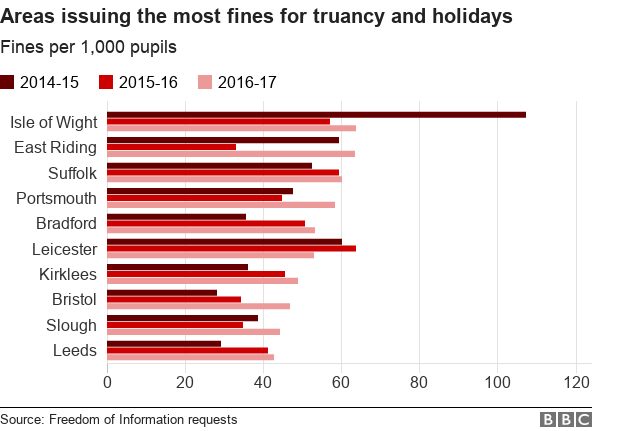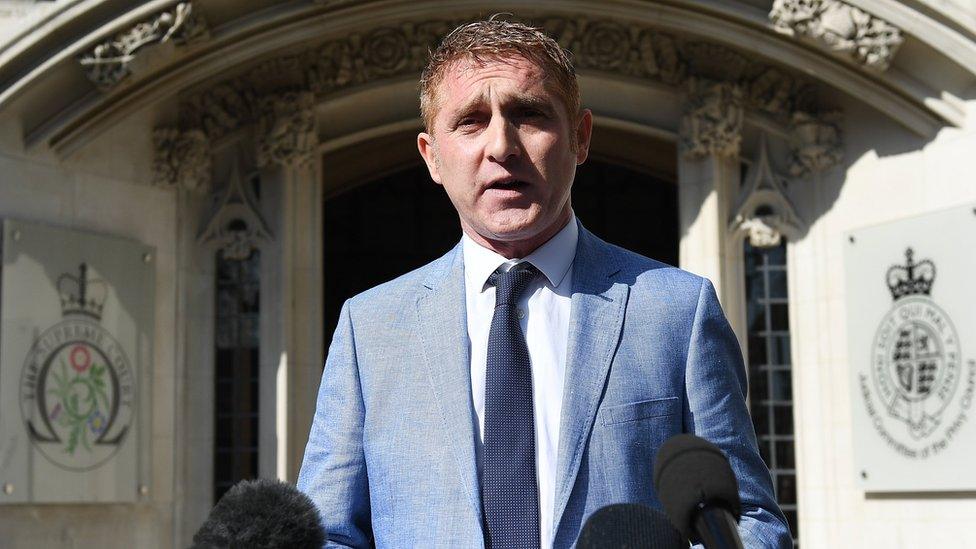Parents fined £24m for children's truancy and term time holidays
- Published

About 400,000 penalty notices for school non-attendance have been issued to parents in England and Wales in the past three years
Parents across England and Wales have been fined about £24m for failing to send their children to school during the past three years, it has emerged.
A BBC investigation also shows some councils are issuing penalties at rates five times higher than the average.
Some parents say they now actively budget for the cost of fines when planning holidays.
While some councils admit they have become "stricter", they say they are protecting the education of children.
Between them, 155 local authorities in England and Wales (Scotland and Northern Ireland do not issue fines) issued about 400,000 penalties over three years. A further 19 did not supply data.
On average, 12 penalties were issued per 1,000 children - whether for truancy or for parents taking children away on holiday during term time - during 2016-17.

Number of penalties awarded to parents for failing to send their children to school, per 1,000 pupils
Tap or click to explore your area
BBC Freedom of Information requests
Map by Daniel Wainwright and Daniel Dunford, built with Carto.
Can't see the map? Click or tap here, external

Some councils issued penalties at rates five times the average, including the Isle of Wight (64 per 1,000 pupils), which last year won a long-running case over an unauthorised holiday, East Riding of Yorkshire (63 per 1,000) and Suffolk (60 per 1,000).
All three councils issued penalty tickets at a rate of more than 60 per 1,000 pupils (compared with 12 per 1,000 on average). Of the Welsh authorities, Merthyr Tydfil had the highest penalty rate at 4.6 per 1,000 pupils, less than half the average for England and Wales.
Paul Brading, Isle of Wight's cabinet member for schools, said its high rate of fines was because officials want every unauthorised absence to be "thoroughly followed through".
From 2019, the authority is cutting the summer holiday from six to five weeks and introducing a two-week autumn half term instead.
The changes would also give island parents - many of whom work in the tourism sector - greater freedom to take a family break outside traditional school holiday dates.


'I'd do it again'

Dave Brain, wife Hannah, and their three children on their holiday in Florida last summer
When Dave Brain's father passed away, he decided to use money left to him to pay for a family holiday to Florida.
Going during the school holidays, he said, would have cost about £8,000 rather than the £4,500 they would be charged for a term-time trans-Atlantic holiday.
So Mr Brain, wife Hannah and their three children decided to ignore the threat of a £60 fine and flew off for a two-week holiday last September.
Florida as a destination held particular importance for Mr Brain, of Bristol, because his late father used to take him there as a child.
"We try and stick to the holidays," he said. "But this was different and we budgeted for the fine," said Mr Brain, co-creator and producer of the YouTube channel Guksack.
After their return to the UK, the family received a £60 fine for one of their children.
"And I would do it again in an instant if the same opportunity arose," he said.
Have you ever taken your child on a term time holiday? Have you been fined for doing so? Email haveyoursay@bbc.co.uk, external

You may also be interested in:

Court case prompted 'temporary hold'
Some councils reported a drop in the number of fines issued for term-time holidays during a high-profile court case.
In 2017, the Supreme Court ruled against Jon Platt, who had won earlier legal battles against a £120 fine in a case brought by Isle of Wight council.

Jon Platt took his daughter on a week's holiday to Disney World in the United States three years ago without the head teacher's permission
Mr Platt, originally from Northern Ireland, was fined for taking his daughter on holiday without permission.
One authority watching the Platt case closely was Nottingham City Council, where the number of fines issued dropped from 1,129 in 2014-15 to just 282 in 2016-17.
A council spokesman said the authority had "placed a temporary hold on fines for holidays in term-time while we awaited the judgment".
Fining resumed last autumn, he said.
Parents in Nottinghamshire faced the steepest rise in the number of fines issued in England - up tenfold from 370 in 2014-15 to 3,771 in 2016-17.
Denis McCarthy, service manager at Nottinghamshire County Council said the figures reflected schools "being stricter about the circumstances in which they authorise absence".
"It essentially reflects an increased level of enforcement activity being requested by schools in response to parents removing their children from school in term time for an unauthorised leave of absence," he said.
"Historically - compared to some authorities - we issued a small number of fines.
"So, whilst the increases seem significant I think we are now probably more in line with lots of other authorities."
In Essex, the second largest education authority area in the country (after Kent), parents saw the number of penalties issued treble (from 909 in 2014-15 to 3,165 in 2016-17) for unauthorised term time holidays.
Ray Gooding, the authority's cabinet member for education, said: "There are clear links between attendance and attainment, and every lesson really does count."
At the other end of the spectrum is Southend Borough Council, where the number of penalties issued dropped 98% from 52 in 2014-15 to just one - for truancy - in 2016-17.

How do penalties work?

The money from penalties goes to local education authorities to cover the cost of enforcement, including prosecution
Penalty notices can be issued for a number of reasons including truancy, holidays taken during term-time and pupils caught during "exclusion sweeps".
Local authorities act on behalf of schools in issuing penalties, which start at £60 and then rise to £120 if not paid within three weeks.

A spokesman for the Association of School and College Leaders said: "No doubt people will argue that there should be a uniform approach across the country.
"But I would have thought there is a reasonable case for these decisions to be made locally as schools and councils will be in the best position to judge what is most effective as part of an overall strategy to deter unauthorised absences.
"The other point - and surely the most important one - is that there should be no need to issue any penalty notices at all because children should not be removed from school without authorisation."
- Published13 July 2017

- Published6 April 2017

- Published6 April 2017

- Published7 December 2017

- Published6 April 2017

- Published12 August 2015
